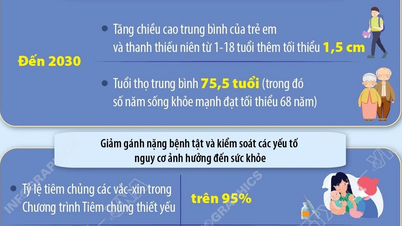
Intermittent fasting is becoming a popular eating trend - Photo: The Conversation
In recent years, intermittent fasting has become a popular eating trend, not only because of its ability to aid weight loss but also because of its potential health benefits.
However, along with its popularity, this method also leads to many misunderstandings that make many people confused when applying it.
One of the biggest concerns is that fasting will slow down your metabolism — which many people believe will lead to weight regain or difficulty losing weight later.
However, studies have shown that short-term fasting not only does not slow down, but can actually boost metabolism by up to 14%.
This is because levels of norepinephrine - a hormone that plays an important role in promoting fat burning - increase during fasting.
In fact, studies have not found any significant decrease in metabolic rate in people who followed this method compared to those who simply cut calories the traditional way.
In addition, the fear of losing muscle when fasting is also common, especially for those who exercise .
However, scientific evidence shows that if you maintain strength training combined with adequate protein intake, muscle mass can still be preserved. In fact, compared to continuous dieting, intermittent fasting helps retain muscle mass while significantly reducing fat.
Third, many people worry that skipping meals will cause blood sugar disorders .
However, intermittent fasting — when done correctly — actually improves insulin sensitivity and helps keep blood sugar more stable over time.
In particular, some people with type 2 diabetes have shown positive changes in blood sugar control when applying this method under medical supervision.
Fourth, many people find that intermittent fasting makes them feel constantly hungry - a big barrier that causes them to give up early.
In fact, in the early stages of the diet, the body may react by increasing the hormone ghrelin - the hormone that stimulates hunger. However, this will not last.
Many studies have shown that the human body will adjust itself, and ghrelin levels will gradually decrease as you get used to the new meal schedule. As a result, the feeling of hunger will also decrease over time,
Finally, the idea that intermittent fasting is ineffective for weight loss is another common misconception.
In complete contrast to the above view, intermittent fasting is considered an effective weight management strategy, because it helps you reduce calories naturally without having to meticulously calculate each meal.
When eating times are limited to a certain time frame during the day, you will naturally eat less and easily maintain your ideal weight.
Source: https://tuoitre.vn/5-lam-tuong-pho-bien-ve-nhin-an-gian-doan-20250919094745599.htm

































![[Photo] Soldiers guard the fire and protect the forest](https://vphoto.vietnam.vn/thumb/1200x675/vietnam/resource/IMAGE/2025/9/27/7cab6a2afcf543558a98f4d87e9aaf95)
































































Comment (0)